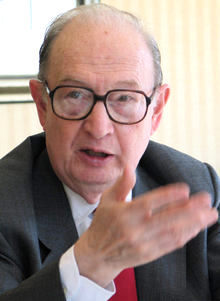 |
The July G8 summit in St. Petersburg, hosted by Russia, was a chance for the Bush administration to show its respect for Russian aspirations to be recognized as a major world power. Instead, Bush invited Georgia’s president, Mikhail Saakashvili, to Washington on the eve of the summit, just three days after an angry Saakashvili-Putin encounter in Moscow. More recently, at the Brussels meeting of the Organization for Security and Cooperation in Europe (OSCE), Undersecretary of State Nicholas Burns criticized Russia for its support of separatists in Moldova and Georgia, charging that "some OSCE countries are resorting to economic and financial pressure to impose on their neighbors." Tensions over Georgia are growing. Since the 2003 U.S.-backed "Rose Revolution," the pro-U.S. Tbilisi government has been pushing for membership in NATO and the European Union and has negotiated economic and military aid and trade agreements with Washington. Moscow sees Georgia’s ties with the Bush administration as anti-Russian and is seeking to restrain their further growth by threatening to double the price of gas to Georgia and to cut off shipments altogether if Georgian ties to Washington continue to grow. Putin is scheduled to step down as President in 2008, but will he actually do so? Most speculation is that he will install a clone as successor, such as Deputy Premier Dmitry Medvedev or Defense Minister Sergei Ivanov. The Financial Times has reported that "senior officials" in Moscow believe that the West will seek to meddle in Russian politics to influence the post-Putin succession. Most Russians believe that the CIA was active in the Georgian and Ukraine elections, the paper reported, "and that the West will try to pull off the same trick in Russia itself in parliamentary elections next year and in the presidential contest in 2008." The pro-Kremlin party that controls two-thirds of the seats in Russia’s Parliament is United Russia. In a secret speech to party activists obtained by the Financial Times, Vladislav Surkov, deputy chief of staff in the Kremlin, declared that United Russia "must remain dominant for at least 15 years" to preserve what he called " ’sovereign democracy’, roughly translated as ’we’ll do it our way.’ " "The speech was shot through with suspicion bordering on paranoia about the West and its motives," said the Financial Times, "and it is clear that Russia sees itself as a pole in a multi-polar world, aimed above all at counterbalancing U.S. might." Whatever hopes Washington might have had in the days of Boris Yeltsin for a Western-oriented Russia, said Dmitri Trenin of the Carnegie Endowment for International Peace, are now gone. "Moscow has left the Western orbit," he said recently, "and has set out in free flight." Projected gas and oil pipelines across Siberia to China, North and South Korea, and Japan reflect Russian ambitions for greater economic influence in Asia. Significantly, Gazprom, the giant gas monopoly, has made clear that these pipelines will be projections of Russian influence and will not be controlled by international oil companies. Gazprom took over control of the Kovykta pipeline project from British Petroleum last year, and two weeks ago forced Shell to reduce its stake from 55 percent to 25 percent of the $20 billion Sakhalin II gas project. As U.S.-Russian relations cool, U.S. hopes for cooperation with Moscow in preventing an Iranian nuclear weapons program are evaporating. Similarly, there are no signs of Moscow-Washington cooperation in dealing with Lebanon, Syria, Iraq and the Israeli-Palestinian crisis. The most important area where Russian-U.S. cooperation is critical for the future of mankind is nuclear arms control. It is increasingly obvious that the proliferation of nuclear weapons cannot be stopped until the existing nuclear powers begin to reduce their own nuclear weapons. Why should other countries forswear the nuclear option if the existing nuclear powers are upgrading their nuclear weapons, talk openly of using them in future wars and no longer give even lip service to the goal of phasing out nuclear armament that was enshrined in Article Six of the Nuclear Non-Proliferation Treaty? As a recent Foreign Affairs article pointed out, the United States is seeking unchallengeable nuclear dominance not only over "rogue states" but also over the other nuclear weapons states. That is stimulating a new nuclear arms race that makes the prospect of the nuclear weapons reductions envisaged in the NPT ever more distant. It was soon after the announcement of the U.S. "Reliable Warhead Replacement Program" last year that Russia disclosed its new submarine-launched Bulava ICBMs, its plans for bigger and better Bory-class submarines, its first deployments of Topol-M land-based missiles, and its decision to resume the production of nuclear-capable Blackjack bombers. Yet as Russian spokesmen have repeatedly said, they cannot afford to keep up with the United States and are eager to resume the nuclear arms reductions that began with the SALT, START I and START II agreements when and if the United States is ready. Please direct questions or comments to [englishhani@hani.co.kr]





